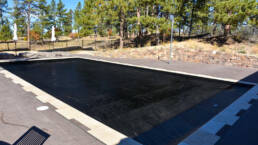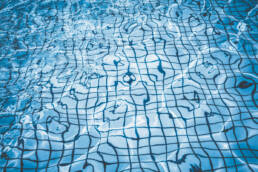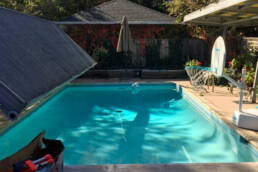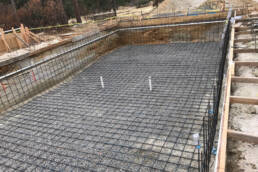A sparkling and inviting pool is often the centerpiece of any property, providing a refreshing escape from the summer heat and a source of relaxation and enjoyment for family and friends. However, maintaining a pool isn’t a seasonal task that you can simply overlook during the cooler months. Year-round pool maintenance is a critical aspect of ensuring that your pool remains a pristine oasis, ready for you to dive into at any time of the year.
Throughout the changing seasons in Denver, Colorado, where temperature fluctuations can be considerable, your pool requires consistent care.
Regular Cleaning
Daily Skimming and Surface Cleaning
One of the fundamental tasks in year-round pool maintenance is the daily skimming and surface cleaning. This seemingly simple activity plays a crucial role in keeping your pool water crystal clear. Leaves, twigs, insects, and other debris have a habit of finding their way into your pool, especially during windy days or when surrounded by trees. To maintain the pristine appearance of your pool, make it a habit to skim the surface every day.
Invest in a quality pool skimmer or net, and take a few minutes each day to remove debris from the water’s surface. This not only enhances the pool’s aesthetics but also prevents these contaminants from sinking to the bottom and potentially causing more significant issues.
Weekly Vacuuming and Brushing
In addition to daily skimming, it’s essential to perform weekly vacuuming and brushing of your pool. These activities ensure that the entire pool, including the walls and floor, remains free from algae and bacteria buildup.
- Vacuuming: Invest in a pool vacuum cleaner or an automatic pool cleaner to efficiently remove dirt and debris that may have settled on the pool’s bottom. Ensure you cover every inch of the pool to prevent the accumulation of sediment.
- Brushing: Regularly brushing the walls and floor of your pool is another critical step. This not only helps in removing algae and bacteria but also prevents the growth of slippery and unsightly algae. Use a pool brush suitable for your pool’s surface (concrete, vinyl, or fiberglass) and scrub gently yet thoroughly.
By incorporating these regular cleaning practices into your pool maintenance routine, you’ll keep your pool water looking inviting and prevent the development of common pool problems.
Water Chemistry
Testing and Balancing pH Levels
Regularly test the pH levels of your pool water using a reliable test kit. The ideal pH range for pool water is typically between 7.4 and 7.6. When the pH is outside this range, it can lead to problems such as skin and eye irritation, inefficient chlorine disinfection, and the corrosion of pool equipment.
To balance the pH levels, you can use pH increasers (to raise pH) or pH decreasers (to lower pH) as needed. By keeping the pH within the recommended range, you ensure that your pool water is comfortable and safe for swimmers.
Chlorine and Sanitation
Proper sanitation is crucial to ensure your pool water remains free from harmful bacteria and contaminants. Chlorine is the most common sanitizer used in pools, and maintaining the right chlorine levels is essential.
Regularly test and maintain chlorine levels within the recommended range (usually 1-3 ppm) to keep your pool water safe. You can use chlorine tablets, liquid chlorine, or a saltwater chlorination system, depending on your pool setup.
Equipment Maintenance
Regular Inspection
Your pool equipment, including pumps, filters, and heaters, plays a vital role in keeping your pool water clean and comfortable. Regular inspection of these components is essential to identify and address any issues promptly.
Check for any visible signs of wear or damage in the equipment. Ensure that the pump is running smoothly and efficiently, and the filter is clean and functioning correctly. Inspect for leaks or unusual noises, as these can be indicators of underlying problems.
Cleaning Filters and Pumps
Cleanliness is key to maintaining the effectiveness of your pool equipment. Cleaning the pool filter is an essential part of equipment maintenance. Depending on the type of filter (sand, cartridge, or DE), follow the manufacturer’s instructions for cleaning and backwashing.
Additionally, clean out the pump strainer basket regularly to prevent clogs and ensure proper water circulation. A clean and well-maintained pump and filter system will help your pool operate efficiently, saving you both time and money in the long run.
Winterizing Your Pool
Preparing for the Off-Season
As the temperatures in Denver, Colorado, begin to drop, and swimming season comes to a close, it’s essential to prepare your pool for the off-season. Proper preparation now can save you a lot of time, effort, and potential damage when the cold weather hits.
- Clean and Store Pool Accessories: Start by removing and cleaning all pool accessories, such as floats, toys, and skimmer baskets. Ensure they are completely dry before storing them in a dry place. This prevents mold and mildew growth during the winter months.
- Balance Water Chemistry: Before winterizing your pool, ensure that the water chemistry is well-balanced. Adjust the pH levels, alkalinity, and calcium hardness as needed. This prevents scale buildup and corrosion during the winter.
- Lower Water Level: Lower the water level in the pool to a level just below the skimmer. This prevents water from freezing and potentially damaging the skimmer and plumbing lines.
Covering and Protecting
- Use a Winter Pool Cover: Invest in a high-quality winter pool cover that fits your pool snugly. A good cover will not only keep debris out of your pool but also protect it from harsh winter weather.
- Secure the Cover: Ensure the cover is securely fastened to prevent it from being blown away by strong winds. Many covers come with water bags or anchors that keep them in place.
- Winterize Pool Equipment: Properly winterize your pool equipment, such as pumps, filters, and heaters. Follow the manufacturer’s guidelines for draining and storing this equipment to prevent damage from freezing temperatures.
- Prevent Freezing: In Denver’s cold climate, it’s essential to take precautions to prevent freezing. Consider using a pool antifreeze solution to protect your plumbing lines and equipment from freezing. Additionally, installing a pool freeze protector can automatically activate your pool equipment if temperatures drop dangerously low.
Professional Help
Hiring a Pool Maintenance Service
While many pool owners can handle routine maintenance tasks, there are times when it’s beneficial to seek professional help, especially during the winterizing process or if you’re unsure about certain aspects of pool care.
Professional pool maintenance services in Denver, Colorado, have the expertise and experience to ensure your pool is properly prepared for the winter. They can perform essential tasks like draining and winterizing your equipment, applying antifreeze, and securing the pool cover with precision.
Scheduling Regular Check-ups
Even if you handle most of your pool maintenance yourself, scheduling regular check-ups with a professional pool maintenance service is a wise choice. They can inspect your pool equipment, plumbing, and overall pool condition to catch any potential issues early before they turn into costly repairs.
By investing in professional help and regular check-ups, you ensure that your pool remains in optimal condition year-round, and you can enjoy a hassle-free pool season when warmer weather returns.
By adhering to these five essential tips for year-round pool maintenance, you’ll not only keep your pool water pristine but also ensure its safety and longevity. From daily skimming and water chemistry management to equipment maintenance and winterizing, each step plays a crucial role in the overall health of your pool.
Contact Laguna Pool to set up your winter maintenance schedule.
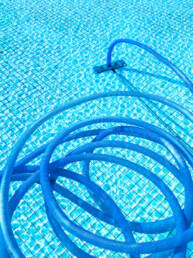
Ready for an expert opinion? Get in touch today!
Laguna Pools is a professional pool and spa contractor that has been servicing the Denver area for over 20 years. We offer routine cleaning and maintenance services, new pool design, construction, and remodeling.
Like this article? Spread the word!
Related Posts
April 23, 2024
Dive In: Top Five Reasons to Use Laguna Pools for Your Denver Area Pool Maintenance
Discover the top five reasons to choose Laguna Pools for your Denver area pool…
January 17, 2024
Understanding the Basics of Spa Maintenance: Tips for a Relaxing Retreat
Discover the secrets to maintaining a pristine spa with Laguna Pools in Denver. From…
December 20, 2023
Winter Pool Maintenance in Denver, CO: 5 Essential Tips for Laguna Pools
Ensure your Denver pool is winter-ready with Laguna Pools' expert tips! From investing in…


